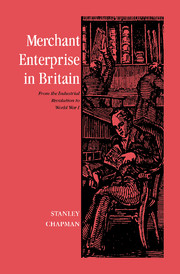Book contents
- Frontmatter
- Contents
- List of figures
- List of tables
- Preface
- Abbreviations used in the footnotes
- Introduction: approaches and concepts
- Part I The setting
- Part II New Streams Of Enterprise
- Part III Response to instant communication
- Part IV Conclusions
- Chapter 10 Performance of British mercantile enterprise
- Manuscript sources
- Index of firms and people
- Index of places
- Index of subjects
Chapter 10 - Performance of British mercantile enterprise
Published online by Cambridge University Press: 20 March 2010
- Frontmatter
- Contents
- List of figures
- List of tables
- Preface
- Abbreviations used in the footnotes
- Introduction: approaches and concepts
- Part I The setting
- Part II New Streams Of Enterprise
- Part III Response to instant communication
- Part IV Conclusions
- Chapter 10 Performance of British mercantile enterprise
- Manuscript sources
- Index of firms and people
- Index of places
- Index of subjects
Summary
Through the various chapters of this book it has become increasingly clear that the data available are far too patchy to reach any precise conclusions on the quality of British mercantile enterprise in the heyday of the country's overseas trading operations. However, it is possible to make some objective judgements from three angles. The role of ethnic, religious and cultural minorities has been a recurrent topic and some final assessment of their contribution is necessary. Secondly, it is possible to assess mercantile enterprise by comparing its achievements with those of other kinds of overseas marketing operations active in the period such as manufacturers selling directly abroad, free standing companies, exploration companies, and other forms of organisation traced by historians in the course of recent research. Finally, we should make a critical assessment of the one distinctive form of mercantile enterprise that emerged in the period, the managing agency system, in the context of other assessments of British economic performance in the nineteenth century.
COSMOPOLITAN MERCANTILE ENTERPRISE
The achievements of British mercantile enterprise in London and the outports in the eighteenth and nineteenth centuries were undoubtedly a consequence of the rich ethnic and cultural mix. As London superseded Amsterdam the cosmopolitan commercial bourgeoisie shifted to the new metropolis of trade, and as Manchester emerged as the ‘metropolis of manufactures’ it too attracted an international trading community. In Chapter i it was noticed that in London in 1763 more than three-quarters of merchants were of foreign origin or descent.
- Type
- Chapter
- Information
- Merchant Enterprise in BritainFrom the Industrial Revolution to World War I, pp. 287 - 318Publisher: Cambridge University PressPrint publication year: 1992



